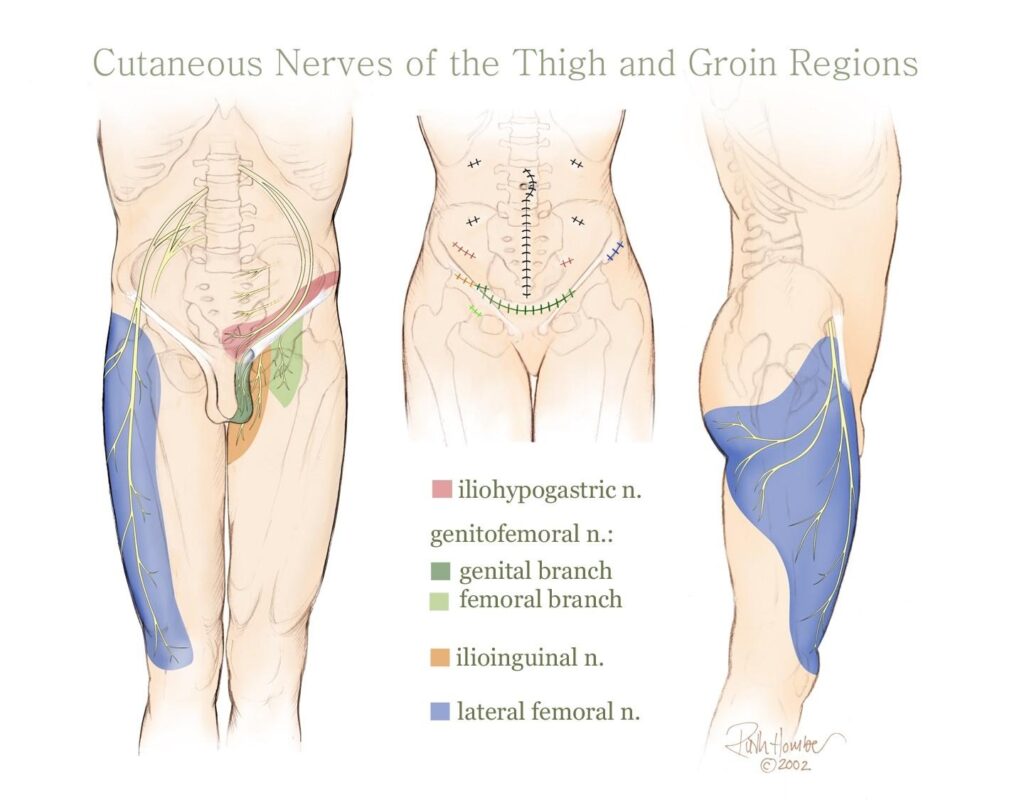Groin / Hernia Pain
The groin is considered to be the areas of the lower abdomen, the crease between the abdomen and the thigh, the upper thigh and the genital area.
There are several nerves that provide sensation to the hip, thigh, “groin crease” (hernia area) and genitals – see the diagram to the right. Each of these locations has its own nerve that provides sensation to it. This can help to localize which nerve is causing pain, and then how to stop it.
Nerves going to the groin area can be injured during sports, trauma, surgery (especially hernia repairs), and even without a known cause.
Pain in these areas is easily diagnosed by a physical exam and possible nerve blocks (numbing shots in the office). Once a diagnosis is made, the patient is 90% of the way toward relief! An outpatient operation can then be planned to successfully relieve or eliminate the pain.

Following hernia surgery, some patients will complain of chronic pain in the lower abdomen, front or inside of the thigh, and/or the penis, scrotum or labia that lasts longer than the ‘normal’ recovery period of three months. There are three small nerves that run through the area where the hernia was fixed that can be stretched, cut or caught up in scar. This can lead to sharp, burning, stabbing, and/or electric shock pain. In some cases, there is urgency or frequency to urinate as well. These symptoms are most often due to chronic peripheral nerve pain.
The same three nerves that can be injured during hernia repair may be the cause for chronic pain after a car accident, a fall, or other traumatic events. These nerves may suffer permanent damage due to stretch, by scarring, or from bruising caused by the accident.
- Abdomen – The iliohypogastric nerve carries sensation to the skin of the lower flank and abdomen.
- Inner thigh and groin – The ilioinguinal nerve
passes through a tunnel between the inguinal rings and leads to the skin over the pubic bone and the labia majora or scrotum. - Thigh, groin and genitalia – The genitofemoral nerve
can be injured and cause pain in the groin, genitalia and/or perineum. The nerve splits into two branches – the femoral branch, which goes to the skin of the thigh below groin crease, and the genital branch, which goes to the skin of the scrotum or labia.
The first thing to do is to make sure that the pain is being caused by one or several nerves, as above. To do this, the doctor takes three steps into account:
- Your description of the pain and where it is.
- An exam of the area, noting areas of numbness and tenderness.
- An ultrasound-guided “block” of the nerves can confirm which nerves are involved, and where they are injured.
Drs. Brown and Hagan have specific expertise in diagnosing nerve injuries that are causing chronic pain, and have significant experience with ultrasound examination and nerve blocks to make the correct diagnosis. This ability adds another level of precision to making sure that surgery is indicated, and that the likely outcome will be significant or complete pain relief.
Once the diagnosis of nerve injury is clear, an operation can be helpful in creating long-lasting relief. Under general anesthesia and outpatient (going home the same day), the surgeon will cut the injured nerve(s) above the area of injury. This will cause a trade-off of numbness in place of the pain.
- Denervation of the Periosteal Origin of the Adductor Muscles in Conjunction with Adductor Fasciotomy in the Surgical Treatment of Refractory Groin Pull; Dellon AL, Williams E, Rosson G, Hashemi S, Tollestrup T, Hagan R, Peled Z, Gurtmueller G, Ebmer J; Plastic and Reconstructive Surgery Journal, Volume 28(4).
Nerve Surgery Helps Relieve Chronic Pain
The majority of patients with chronic pain report significant decreases or complete resolution of their pain following nerve surgery. Most patients describe the ‘nerve pain feelings’ are improved as soon as the following day. Discomfort from the operation is frequently described as a completely different sensation, which subsides in the next few weeks.